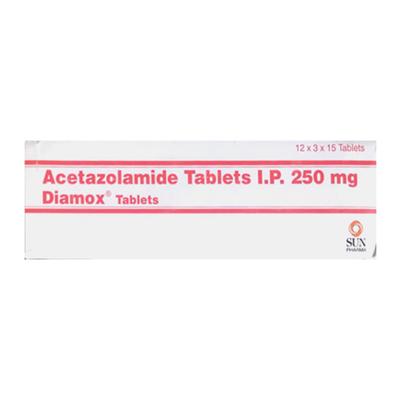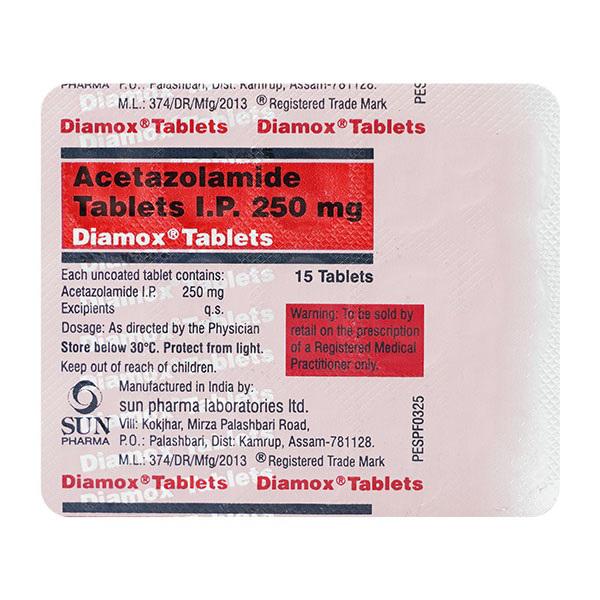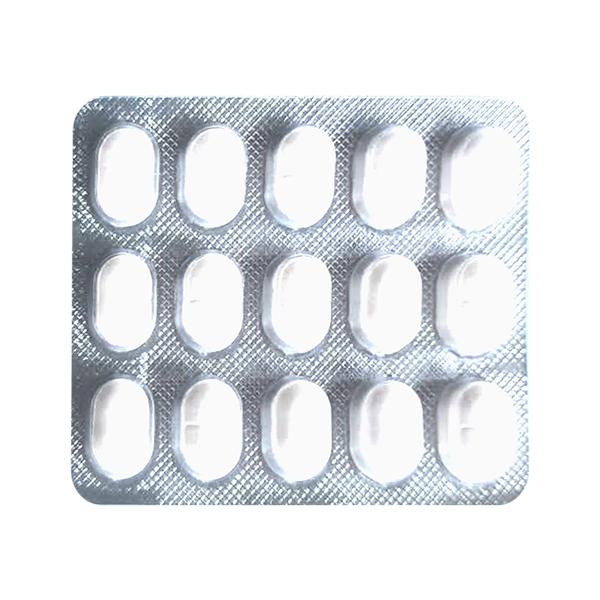

Netmeds First Membership
Quick Links
Introduction About DIAMOX 250MG TABLET
DIAMOX 250MG TABLET contains Acetazolamide, which belongs to the group of medicines called Carbonic Anhydrase Inhibitors. It is used in the management of glaucoma, retention of fluids in the body, and epilepsy (fits). Glaucoma is a condition of the eyes that can result in loss of vision and blindness by damaging a nerve in the back of the eye called the optic nerve.
Before starting with the management, your doctor may advise you to undergo some blood tests to check if management with DIAMOX 250MG TABLET is suitable for you. Tell your doctor if you are due to have any medical tests, as DIAMOX 250MG TABLET may interfere with these tests.
Before taking DIAMOX 250MG TABLET, inform your doctor if you have or ever had severe kidney, liver, or lung problems, chronic non-congestive angle closure glaucoma, reduced function of adrenal glands (Addison’s disease), low sodium/potassium levels, or high chlorine levels in the blood.
DIAMOX 250MG TABLET is not recommended for use in pregnancy and should be taken with consultation of a doctor during breastfeeding. In children and adolescents, the correct dose of DIAMOX 250MG TABLET will be decided by the doctor, according to the patient’s body weight.
A small number of people being managed with medicines like DIAMOX 250MG TABLET have had thoughts of harming or killing themselves. If you experience anything like that, immediately contact your doctor. The most common side effects of taking DIAMOX 250MG TABLET are extreme tiredness, nausea, vomiting, stomach pain, and diarrhea. Consult your physician if any of the symptoms worsen over time.
Uses Of DIAMOX 250MG TABLET
Manages
- glaucoma
- abnormal fluid retention in the body
- epilepsy
How DIAMOX 250MG TABLET Works
DIAMOX 250MG TABLET effectively manages glaucoma by blocking an enzyme called carbonic anhydrase that reduces the production of aqueous humor (fluid in the eye) and lowers the intraocular (eye) pressure. It controls epilepsy (fits) by directly blocking an enzyme in the central nervous system, hence increasing the oxygen level of the body. DIAMOX 250MG TABLET also acts on certain parts of the kidneys, which increases the excretion of certain substances through urine, which helps in the release of retained fluid in the body and hence relieves fluid retention.
How to use DIAMOX 250MG TABLET
Take DIAMOX 250MG TABLET as advised by your physician. Swallow the medicine with a glass of water. Do not crush or chew it. Your doctor will decide the correct dose and duration for you depending on your age, body weight, and disease condition.
Side Effects Of DIAMOX 250MG TABLET
Common
- extreme tiredness
- nausea, vomiting
- stomach pain, diarrhea
- tingling or pricking sensation
Uncommon
- kidney stones
Rare
- skin rashes, including an increased sunlight sensitivity
Stop taking DIAMOX 250MG TABLET if you experience any of the following symptoms and contact your doctor immediately:
- sudden wheezing or difficulty in breathing
- swelling of eyelids, lips, or face
- rash or itching (affecting your whole body)
- effect on blood cells (sore throat or fever, tiny reddish-purple spots on skin or bruises, weak muscles, fits)
- kidney problem (difficulty in urination, pain in lower back, burning sensation or pain while passing urine, stop passing urine, have blood in urine)
- liver problem (pale, black, or tarry stools, slight yellowness of skin or eyes)
- thoughts of harming or killing oneself
How To Manage Side Effects
Diarrhea
Drinking plenty of water and other electrolyte-balanced fluids (like diluted fruit juices, broths, sports drinks, and caffeine-free sodas) will help with hydration. Try to eat less high-fat foods, like meat, eggs, and cheese. Exercise more regularly. If the diarrhea persists, contact your doctor.
Nausea And Vomiting
Take DIAMOX 250MG TABLET with, or just after meals. Stick to simple meals. Try to avoid oil-rich or spicy foods, sugary snacks, and aerated drinks. Avoid drinking too much liquid or water along with your meals, and slowly drink in between meals. If the nausea and vomiting persist, contact your doctor.
Skin rash Or Itching
Avoid hot showers, as they can further irritate your skin. Do not scratch the affected area. Use protective clothing when going outdoors. Regularly moisturize your skin. If the skin rash persists, contact your doctor.
Warning & Precautions
Pregnancy
Monitoring requiredDIAMOX 250MG TABLET is not recommended for use in pregnant women unless considered clearly necessary. Consult your doctor before taking it.
Breastfeeding
Consult your doctorDIAMOX 250MG TABLET should be used in breastfeeding women on your doctor’s advice, so consult your doctor before taking it.
Driving and Using Machines
Use with CautionDo not drive or operate any machines if you feel drowsy, confused, or have shortsightedness after taking DIAMOX 250MG TABLET.
Kidney
Consult your doctorDIAMOX 250MG TABLET is not recommended for use in patients with severe kidney disease.
DIAMOX 250MG TABLET should be used with caution in patients with other kidney problems like kidney stones. Consult your doctor before taking it.
Liver
ContraindicatedDIAMOX 250MG TABLET is not recommended for use in patients with severe liver disease. Consult your doctor before taking it.
Allergy
ContraindicatedDo not take DIAMOX 250MG TABLET if you are allergic to acetazolamide or any of the other ingredients of this medicine.
Lungs
Use with CautionDIAMOX 250MG TABLET should be taken with caution in patients having lung problems like chronic bronchitis or emphysema with difficulty breathing. Consult your doctor before taking it.
Use In Pediatrics
Consult your doctorThe doctor will decide the correct dose and duration of DIAMOX 250MG TABLET based on your child’s body weight. Consult your child’s doctor for advice.
Use In Geriatrics
Use with CautionDIAMOX 250MG TABLET should be used with caution in elderly patients (aged above 65 years). Consult your doctor before taking it.
Others
DIAMOX 250MG TABLET is not recommended for use if you:
- have or had chronic non-congestive angle closure glaucoma (blurred vision, eye pain, halos around lights)
- have reduced function of adrenal glands
- have hypokalaemia (low potassium levels in the blood)
- have hyponatremia (low sodium levels in the blood)
- have hyperchloremia (high levels of chlorine in the blood)
Interactions
A. Drug-drug interactions:
Before taking DIAMOX 250MG TABLET, inform your doctor if you are taking any of the following medicines:
- cardiac glycosides (used to manage heart problems) Ex. digoxin
- medicines used to reduce blood pressure (Ex. ramipril, atenolol)
- medicines used to thin your blood (Ex. warfarin)
- medicines used to lower the sugar in your blood (Ex. metformin, gliclazide)
- medicines used for epilepsy or fits (Ex. phenytoin, primidone, carbamazepine, topiramate)
- methotrexate (used in cancer management)
- medicines used to manage infections (Ex. pyrimethamine, trimethoprim)
- medicines used to manage inflammatory conditions (Ex. dexamethasone, prednisolone)
- medicines used for mouth ulcers (Ex. salicylic acid, choline salicylate)
- other medicines used to manage glaucoma (Ex. dorzolamide, brinzolamide)
- medicines used to stimulate your brain (Ex. amphetamine, bupropion)
- quinidine (manages an irregular heartbeat)
- methenamine (inhibits urine infections)
- lithium (manages severe mental problems)
- sodium bicarbonate therapy (used to manage high states of acid in the body)
- ciclosporin (used to suppress immunity)
Overdosage:
If you or anyone else accidentally take too much of DIAMOX 250MG TABLET, consult your doctor immediately or visit the nearby hospital.
Synopsis
| Drug | : | Acetazolamide |
| Pharmacological Category | : | Carbonic Anhydrase Inhibitors |
| Therapeutic Indication | : | Glaucoma, Retention of fluids, Epilepsy |
| Dosage Forms | : | Tablet, Capsule |
More Information
Storage
- Keep DIAMOX 250MG TABLET out of reach of children
- Store at room temperature, not above 25°C
FAQs About DIAMOX 250MG TABLET
Q: Is DIAMOX 250MG TABLET a diuretic?
A: Yes. DIAMOX 250MG TABLET can be used as a diuretic (water tablets). Also, it is the only carbonic anhydrase inhibitor that can be used as a diuretic. Your doctor may prescribe other medicines as well after assessing your condition.
Q: Can DIAMOX 250MG TABLET be taken during pregnancy?
A: No. DIAMOX 250MG TABLET is not recommended for use in pregnancy. If you are pregnant, think you may be pregnant, or are planning to have a child, consult your doctor before taking it.
Q: What precautions do I need to follow while taking DIAMOX 250MG TABLET?
A: Patients taking DIAMOX 250MG TABLET must inform their doctor if they have any pre-existing disease affecting their liver, kidney, or lungs. As DIAMOX 250MG TABLET acts on the kidneys, it can result in a high load on them, resulting in impaired function. Consult your doctor for advice.
Q: Is DIAMOX 250MG TABLET a drug of choice in the management of glaucoma?
A: Yes. DIAMOX 250MG TABLET is the drug of choice in the management of glaucoma (increased pressure in the eye). DIAMOX 250MG TABLET helps in getting rid of the retained fluid in the body, hence relieving the increased eye pressure. But if you have a particular type of glaucoma known as chronic non-congestive angle closure glaucoma, then you must be cautious. Your doctor will be able to advise you according to your condition.
Q: Can DIAMOX 250MG TABLET make you feel tired?
A: Yes. Tiredness is a common side effect of DIAMOX 250MG TABLET. Make sure you know how the medicine affects you before you drive or do anything that requires concentration. Consult your doctor for advice.
Q: Can DIAMOX 250MG TABLET be used for altitude sickness?
A: Yes, DIAMOX 250MG TABLET is commonly used to manage symptoms of altitude sickness, such as headache, dizziness, nausea, and shortness of breath. It works by helping the body adjust to the decreased oxygen levels at high altitudes.
Q: Can DIAMOX 250MG TABLET cause dehydration?
A: DIAMOX 250MG TABLET may increase urination, leading to fluid loss and potential dehydration, especially in individuals at risk of dehydration such as those hiking at high altitudes. It's important to stay well-hydrated and drink plenty of fluids while taking Diamox.
Q: Can DIAMOX 250MG TABLET cause potassium loss?
A: DIAMOX 250MG TABLET may increase urinary excretion of potassium, leading to potassium loss. Your healthcare provider may monitor your potassium levels and may recommend potassium supplements or dietary adjustments if necessary.
Q: How long does it take for DIAMOX 250MG TABLET to start working?
A: The onset of action of DIAMOX 250MG TABLET may vary depending on the condition being managed. For management of altitude sickness, it is generally recommended to start taking this medicine one to two days before ascent to high altitude. For other conditions, such as glaucoma, it may take several days to weeks to see the full effects of the medication.
Q: What is DIAMOX 250MG TABLET used for?
A: DIAMOX 250MG TABLET is used in the management of glaucoma, retention of fluids in the body, and epilepsy (fits). Consult your doctor before taking it.
Q: Is DIAMOX 250MG TABLET safe for kidneys?
A: DIAMOX 250MG TABLET is not recommended for use in patients with severe kidney disease. It should be used with caution in patients with other kidney problems like kidney stones. Consult your doctor before taking it.
Q: Who should avoid taking DIAMOX 250MG TABLET?
A: DIAMOX 250MG TABLET is not recommended for use if you have severe kidney disease, severe liver disease, or are allergic to Acetazolamide, or have or had chronic non-congestive angle closure glaucoma (blurred vision, eye pain, halos around lights), reduced function of adrenal glands, hypokalaemia (low potassium levels in blood), hyponatremia (low sodium levels in the blood), or hyperchloremia (high levels of chlorine in blood). Consult your doctor before taking it.
References
1. KD. Tripathi. Antiadrenergic Drugs and Drugs for Glaucoma. Essentials of Medical Pharmacology. Seventh Edition. 2013. Page – 155.
2. Sanah Aslam, Vikas Gupta. Carbonic Anhydrase Inhibitors. NIH National Library of Medicine, National Center for Biotechnology Information. StatPearls [Internet]. Nov 2021. [Accessed on 13th August 2024] https://www.ncbi.nlm.nih.gov/books/NBK557736/
3. Khashayar Farzam; Muhammad Abdullah. Acetazolamide. NIH National Library of Medicine, National Center for Biotechnology Information. StatPearls [Internet]. July 2022. [Accessed on 13th August 2024] https://www.ncbi.nlm.nih.gov/books/NBK532282/
4. Rahim Kassamali, Domenic A Sica. Acetazolamide: a forgotten diuretic agent. NIH National Library of Medicine, National Center for Biotechnology Information. Pubmed.gov. November-December 2011. [Accessed on 13th August 2024] https://pubmed.ncbi.nlm.nih.gov/21983315/#:~:text=Abstract,by%20a%20brisk%20alkaline%20diuresis.
5. Custom Pharmaceuticals Limited. Electronic Medicines Compendium (EMC). [Revised in June 2019] [Accessed on 13th August 2024] https://www.medicines.org.uk/emc/files/pil.2785.pdf
6. MIMS. Acetazolamide. [Accessed on 13th August 2024] https://www.mims.com/india/drug/info/acetazolamide?type=full&mtype=generic
Useful Diagnostic Tests
- Tonometry
- Complete Blood Count (CBC)/ Hemogram
- Kidney Function Test (KFT)
- Serum Electrolytes/ Electrolytes Profile
- Healthy Midlife Checkup
- Men Health Checkup - Advanced
- Complete Women Checkup
- Women Health Checkup - Essential
- Full Body Checkup - Gold
- Full Body Checkup – Silver










